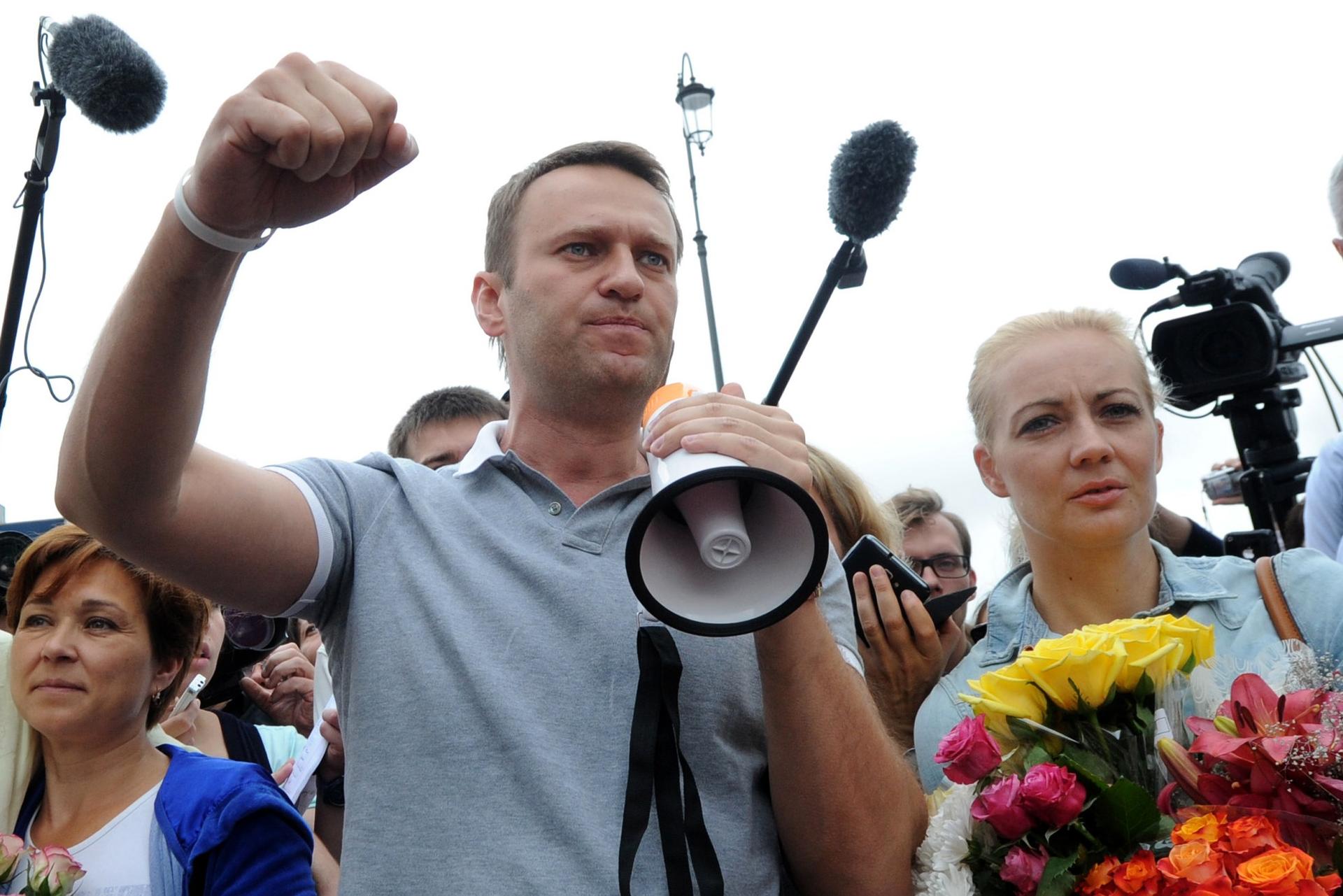Russia’s opposition leader headed for almost certain loss in Moscow elections
Navalny with his wife Yulia. The opposition leader hasn’t shied away from campaigning against the authorities in the face of their curious treatment of him.
He may not win, but he'll have damn well tried.
Although Russian opposition leader Alexei Navalny appears poised to lose Sunday’s high-profile mayoral election in Moscow by a landslide, observers say his hard-fought race to the finish won’t be all for naught.
Despite his being mired by mudslinging and a looming prison sentence, the anti-corruption blogger’s campaign appears to have infused politics in the Russian capital with a renewed sense of vigor.
“Navalny has run a classic election campaign — as if there were free elections in Russia,” says political commentator Alexander Morozov.
His battle has been distinctive for featuring all the hallmarks of grassroots politics in Western democracies: aggressive street campaigning, an army of dedicated volunteers and a well-oiled social media machine.
Bright red campaign stickers bearing his slogan, “Change Russia — Start with Moscow,” have popped up like mushrooms on everything from lampposts to car windshields.
He’s worked crowds small and large in far-flung corners of the sprawling city, fielding questions from voters both enthusiastic and skeptical of his inexperience and apparent nationalist bent.
His style stands in stark contrast to that of the Kremlin-backed incumbent, a gray, uncharismatic technocrat named Sergei Sobyanin. Although able to boast of widespread support for having improved the city’s infrastructure, he’s largely avoided public debate.
Navalny has steadily crept up in the polls thanks to his aggressive campaigning while Sobyanin has mostly hovered. Nevertheless, the incumbent mayor — a close ally of President Vladimir Putin — appears set for an easy victory. A recent poll by the independent Levada Center handed him 58 percent of the vote to Navalny’s 18 percent.
Other polls predict an even wider gap.
Some believe the authorities allowed Navalny — the undisputed leader of the anti-Kremlin protests that erupted in late 2011 — to run in order to appease a disgruntled electorate, then eliminate him from the political arena via the ballot box.
In July, he was sentenced to five years in prison for stealing around $500,000 worth of timber, a charge his supporters say was fabricated. But he was released a day later to compete in the elections after thousands rallied in central Moscow to protest the verdict.
The authorities probably also hope the ballot will bestow a degree of legitimacy on Sobyanin, who was installed in 2010 by then-President Dmitry Medvedev. That would be an important factor in a city that hasn’t elected its mayor in ten years.
In any other country, support from a paltry 18 percent of the electorate would go unnoticed. But some observers believe Russia’s political decisionmakers underestimated the impact Navalny, victorious or not, could have on Russian political life.
For an embattled opposition, even a low double-digit figure is a propaganda coup.
“It’s completely clear that the political and security leadership does not have a ready solution as to what to do with Navalny after the election with his double-digit results,” wrote prominent Russian columnist Andrei Kolesnikov in the Vedomosti daily on Wednesday.
In an interview with Russian state television and the Associated Press published Wednesday, Putin said he would work with whoever was elected mayor, but suggested that Navalny — without referring to him by name — lacks the necessary experience.
“Riding the fashionable theme of battling corruption does not mean that you can govern a city of 12 million and effectively fight this corruption,” he said, according to a transcript of the interview posted to the Kremlin’s website.
Navalny has fought an uphill battle even though the authorities guaranteed a clean campaign. In the past month, he’s faced allegations of illegal funding and seen police confiscate allegedly unsanctioned campaign materials.
More from GlobalPost: Anti-gay groups stage mounting attacks in Ukraine
There’s also the question of what comes next. Even if he were to do well in the election, Navalny remains an unknown quantity outside Russia’s largest cities, particularly Moscow and St. Petersburg.
That lends a degree of uncertainty to the momentum of an opposition movement he helped create.
Still, Morozov says that if Navalny is able to muster up to around 20 percent in Sunday’s vote, it may send a loud enough message for the Kremlin to hear.
“That figure would speak to the fact that the authorities must enact political reforms, and that they can’t ignore [that part of the electorate] anymore.”
Every day, reporters and producers at The World are hard at work bringing you human-centered news from across the globe. But we can’t do it without you. We need your support to ensure we can continue this work for another year.
Make a gift today, and you’ll help us unlock a matching gift of $67,000!
